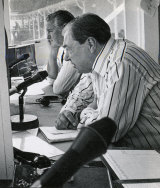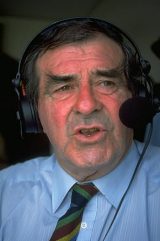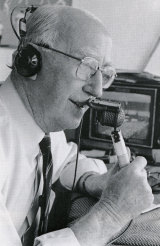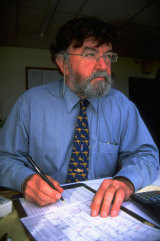Good morning and welcome ...
The best XI from the Test Match Special commentary team
|
|

|
Considered by many to be the best of them all, Arlott's purposeful delivery and rich use of language - he was first employed by the BBC to front poetry programmes - still resonates to this day. In many people's minds the era where he and Brian Johnston were the anchors was the high watermark of TMS. Serious and sombre, he used words sparingly but clinically, and it was a measure of just how highly he was regarded that when he finished his final spell - at Lord's in the 1980 Centenary Test, where he slipped out with no flourish - the crowd and players all stood to applaud.
When Johnston was unceremoniously dumped by BBC TV in 1969 at the age of 58 it was thought that might mark the end of his cricketing broadcast career. In fact, it was the start of more than two decades on the radio. His schoolboyish humour often overshadowed a deep knowledge of the game, but his light-heartedness was a perfect foil to seriousness of Arlott. Some bemoaned the frivolity - and the stream of cakes that were showered on TMS - but the public loved him. He died in harness at the age of 81 and a service of thanksgiving at Westminster Abbey was oversubscribed. John Major, the prime minister, said: "Summers will never be the same again".
A promising schoolboy cricketer whose career was ended when he was hit by a bus, it is unlikely that anyone with Blofled's plumby accent and idiosyncratic style would get past the first interview stage today. But in two stints with the BBC - interrupted by an unsuccessful foray into TV with Sky - Blofeld has become immensely popular, often for his descriptions of events surrounding the cricket, with pigeons and passing buses to the fore. He often seems to bumble through commentaries, but that only seems to add to his appeal.
|
|

|
Trueman, a summariser rather than a commentator, certainly did not need a publicist, so good was he at blowing his own trumpet, and listeners either loved or loathed him. He was a non-nonsense individual who knew the game inside out, and in an era where there was still a rather deferential approach he never shirked from saying exactly what he thought. Given a long rain break, and Trueman, a natural raconteur, was in his element, but he was rather prone to giving the impression that he felt everything was better when he was a player.
The longest-serving of the current commentators, he joined the BBC in 1970 and in 1973 was appointed cricket correspondent, a role he retained until 1990, albeit with a gap between 1981-84 during which time he edited The Cricketer. His style is uncomplicated and seemingly effortless, although colleagues testify that behind the scenes things are far less calm. He is a throwback to an earlier era, although a man who once tried to make an international call on his hotel remote control has embraced most innovations wholeheartedly.
Agnew seems to have been around forever, and that's hardly surprising as he has been the BBC's cricket correspondent for 16 years. Appointed in 1991 after Martin-Jenkins left to join The Daily Telegraph, he was initially a summariser, striking up an instant rapport with Johnston, whose humour was akin to his own, and producing one of the most famous radio moments with the "leg-over" broadcast in his first summer. But he is a natural broadcaster, who speaks with authority and unlike some former players, one who is never afraid to say exactly what he thinks.
|
|

|
The game's longest-serving commentator - he first broadcast in Australia in 1934 - McGilvray had captained New South Wales and had even given close-of-play reports on matches in which he was playing. He was sent by ABC to cover the 1948 Ashes series and from 1961 he was the automatic choice when the BBC included a guest broadcaster from the tourists. His style was quiet, considered and intelligent, and, like Arlott, he signed off with style at The Oval in 1985 with a simple "Well, that's my story".
Alston had been one of the regular commentary team - along with EW Swanton and Arlott - since the war, as well as acting as a producer, and was one of the original TMS team. His real love was rugby - he won a Blue at it at Cambridge - and he covered that and many other sports for the BBC inlcuding five Olympics and countless Wimbledons. His voice was described by Wisden as being a "precise, light baritone". In October 1985, Alston had the possibly unique experience of reading his own obituary in The Times after an internal mix-up. The following year he became the only man to have had a wedding announcement printed in the paper after his obit.
A legendary producer who ruled the roost in the north, Mosey - christened the 'Alderman' by Johnston who thought he looked at home at a mayor's reception - he had little time for anyone who had not come through the journalistic system of local papers, and even less time for those he felt had been born privileged. Outwardly stern, he was nevertheless prone to fits of giggles, usually instigated by Johnston. But he was a consummate professional - as an author as well as a broadcaster - with a rich command of the language. Sadly, he fell out with the BBC who took objection to some typically blunt comments in his autobiography (The Alderman's Tale).
|
|

|
The ever-present Frindall has been the TMS scorer for more than four decades, employed when he wrote a letter to the BBC offering his services when Arthur Wrigley died suddenly in 1966. Aside from a decision not to try to cover the burgeoning number of ODIs, he shows no signs of slowing down. Known universally as "The Bearded Wonder" - another Johnston tag - the computer age means he no longer has to haul cases of books and records up flights of stairs. A highly-respected statistican away from TMS, his comments are brief but always to the point, and although he started as one of the silent backroom staff, he soon became an essential part of the team in his own right.
In TMS terms, Bailey (The Boil) and Trueman were almost as much of a fixture as Arlott and Johnston and both were put out to grass together at the end of 1999 as the BBC looked to appeal to a younger audience. Invariably jolly, unlike his batting, he was nevertheless more than willing to offer a simple "can't bat" or "can't bowl" to any newcomer he thought was not up to it. He also talked a great deal of sense without slipping into Trueman's rose-tinted view of the past.
Martin Williamson is executive editor of Cricinfo